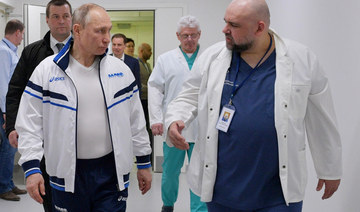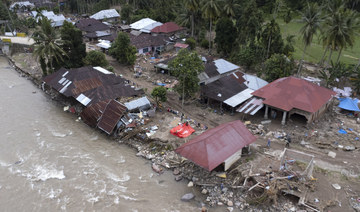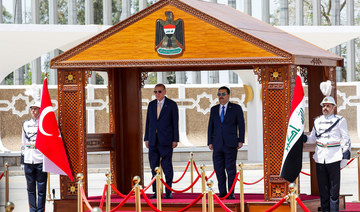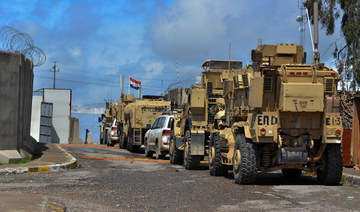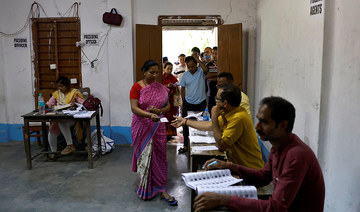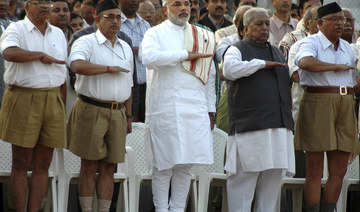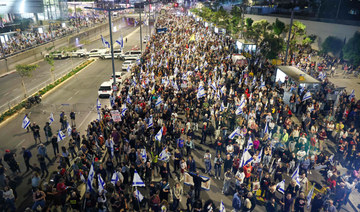PARIS: World leaders in voluntary or enforced isolation have, like billions of people around the globe, been forced to change their lifestyles during the COVID-19 pandemic.
Here is a snapshot:
The German chancellor on Friday emerged from 14-days quarantine in her Berlin home and returned to her offices where she will continue to run the country via video and audio conference.
She had gone into isolation after meeting a doctor who was infected, but was negative in a series of tests.
During the crisis she has been photographed in a supermarket, pushing a trolley containing four bottles of wine and a pack of toilet paper, something she had criticized some Germans for massively stockpiling.
British Prime Minister Johnson has been confined to Downing Street since testing positive on March 27, after suffering mild symptoms.
He said on Friday he would continue his self-isolation as “alas, I still have one of the minor symptoms... a temperature.” His partner, Carrie Symonds, who is pregnant, has not been living with him during his isolation.
He has led a cabinet meeting by videoconference and has put self-filmed videos of himself on Twitter, seeking to “reassure” the nation that he is in “constant touch” with his ministers and the health authorities in the fight against the coronavirus.
The Canadian Prime Minister has led his country from isolation in his official Rideau Cottage residence in Ottawa, since his wife Sophie Gregoire was diagnosed positive on March 12.
Every morning he goes onto the lawn to give a news conference, at which he announces the new measures adopted that day and gives news of his family. He has stressed that he has no symptoms and has canceled all travel.
Officially cured on March 28, his wife has since taken their three children to the prime minister’s summer residence.
The US president, who has tested negative twice, has canceled several campaign meetings across the country as he seeks re-election in November. Except for a flying visit to a Virginia naval base, he has remained in Washington, mainly at the White House.
He hold a daily press conference, followed live by millions of television viewers. He also tweets and gives frequent interviews on Fox News.
Russian President Putin is working remotely from his country residence at Novo-Ogaryovo outside Moscow. He is being tested regularly for the virus as are the people in his entourage and is fine so far, the Kremlin said.
Concerns over his health emerged after he was shown on television shaking hands, without protective clothing, with the chief doctor of Moscow’s main hospital, who then tested positive.
On Wednesday, Putin was shown on television having his first video conference with the prime minister and the cabinet.
Macron has not been tested, according to his entourage, because he has no symptoms. Nine-tenths of workers at his Elysee palace have been sent home and the press has reported that some people in his entourage have tested positive.
While France is in confinement, he regularly goes out to meet care workers, researchers and workers without wearing a mask, except in hospital, in line with an official French position that masks are only useful for the infected and care workers.
He greets people in an Indian way, with his hands joined. The official photographer has tweeted a photo of him washing his hands.
The Japanese prime minister has been very visible during the crisis addressing parliament several times a day and giving televised press conferences most weekends.
Since the crisis began in the country hit the hardest, Italy’s Prime Minister Conte has been a frequent presence on television, cutting into evening programming to announce new security measures from Palazzo Chigi, his official residence.
Conte has been photographed working at his desk, participating in meetings over videoconference and taking calls.
Conte told La Repubblica daily in March that he had tested negative for the coronavirus, saying his doctors “follow me closely.
The Chinese leader kept a low profile at the beginning of the epidemic which first broke out in China in December, appearing only in mid-February wearing, like the vast majority of Chinese, a mask as COVID-19 raged.
Also the number one of the Chinese Communist Party, he has mainly remained in Beijing during the epidemic, except for a visit to the epicenter Wuhan in central China as the situation started to improve there. He only leaves the capital to encourage the resumption of economic activity.
Reports about him are shown every evening on the television news showing him with or without a mask: uncovered when he addresses a giant videoconference with hundreds of provincial officials or with leaders of the G20, but covered during this week’s visit to provincial factories and farms.
He continues to preside meetings, to publish articles in the official press and give major speeches, cementing his role as the head of the fight against the new coronavirus.
It is not known if he has been tested.
How world leaders are living through COVID-19
https://arab.news/cuzt3
How world leaders are living through COVID-19

- Macron regularly goes out to meet care workers, researchers and workers without wearing a mask, except in hospitals
- Russian President Putin is working remotely from his country residence at Novo-Ogaryovo outside Moscow
UN officials urge UK to reconsider plan to transfer asylum seekers to Rwanda
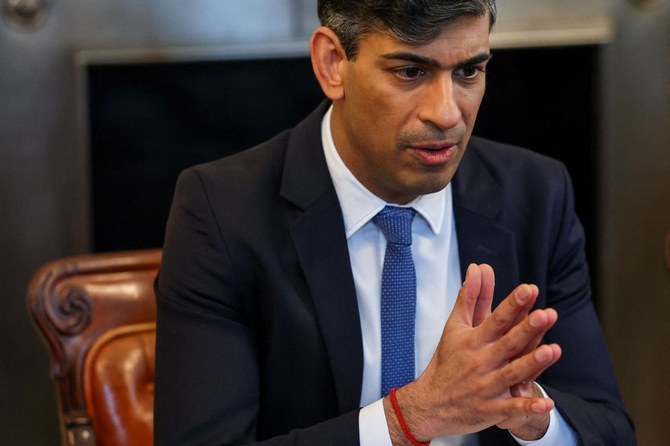
In a joint statement, Filippo Grandi, the UN High Commissioner for Refugees, and Volker Turk, the UN High Commissioner for Human Rights, called on the UK to instead take practical measures to address irregular flows of migrants and refugees.
British Prime Minister Rishi Sunak promised on Monday to start sending asylum seekers to Rwanda within 10 to 12 weeks as the upper house of parliament passed legislation that had been delayed for weeks by attempts to alter the plan.
Asia hit hardest by climate, weather disasters in 2023:UN
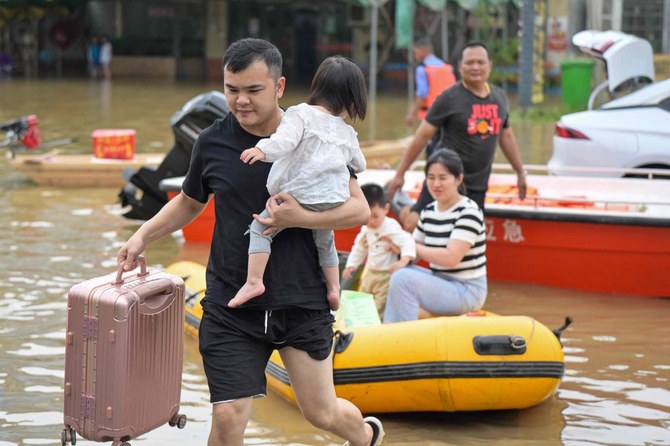
- UN’s weather and climate agency said Asia was warming at a particularly rapid pace
GENEVA: Asia was the world’s most disaster-hit region from climate and weather hazards in 2023, the United Nations said Tuesday, with floods and storms the chief cause of casualties and economic losses.
Global temperatures hit record highs last year, and the UN’s weather and climate agency said Asia was warming at a particularly rapid pace.
The World Meteorological Organization said the impact of heatwaves in Asia was becoming more severe, with melting glaciers threatening the region’s future water security.
The WMO said Asia was warming faster than the global average, with temperatures last year nearly two degrees Celsius above the 1961 to 1990 average.
“The report’s conclusions are sobering,” WMO chief Celeste Saulo said in a statement.
“Many countries in the region experienced their hottest year on record in 2023, along with a barrage of extreme conditions, from droughts and heatwaves to floods and storms.
“Climate change exacerbated the frequency and severity of such events, profoundly impacting societies, economies, and, most importantly, human lives and the environment that we live in.”
The State of the Climate in Asia 2023 report highlighted the accelerating rate of key climate change indicators such as surface temperature, glacier retreat and sea level rise, saying they would have serious repercussions for societies, economies and ecosystems in the region.
“Asia remained the world’s most disaster-hit region from weather, climate and water-related hazards in 2023,” the WMO said.
Ranging disasters
The annual mean near-surface temperature over Asia in 2023 was the second highest on record, at 0.91 degrees Celsius above the 1991-2020 average, and 1.87 C above the 1961-1990 average.
Particularly high average temperatures were recorded from western Siberia to central Asia, and from eastern China to Japan, the report said, with Japan having its hottest summer on record.
As for precipitation, it was below normal in the Himalayas and in the Hindu Kush mountain range in Pakistan and Afghanistan.
Meanwhile southwest China suffered from a drought, with below-normal precipitation levels in nearly every month of the year.
The High-Mountain Asia region, centered on the Tibetan Plateau, contains the largest volume of ice outside of the polar regions.
Over the last several decades, most of these glaciers have been retreating, and at an accelerating rate, the WMO said, with 20 out of 22 monitored glaciers in the region showing continued mass loss last year.
The report said 2023 sea-surface temperatures in the northwest Pacific Ocean were the highest on record.
Water-related hazards
Last year, 79 disasters associated with water-related weather hazards were reported in Asia. Of those, more than 80 percent were floods and storms, with more than 2,000 deaths and nine million people directly affected.
“Floods were the leading cause of death in reported events in 2023 by a substantial margin,” the WMO said, noting the continuing high level of vulnerability of Asia to natural hazard events.
Hong Kong recorded 158.1 millimeters of rainfall in one hour on September 7 — the highest since records began in 1884, as a result of a typhoon.
The WMO said there was an urgent need for national weather services across the region to improve tailored information to officials working on reducing disaster risks.
“It is imperative that our actions and strategies mirror the urgency of these times,” said Saulo.
“Reducing greenhouse gas emissions and adapting to the evolving climate is not merely an option, but a fundamental necessity.”
Jury deliberating in Iraq Abu Ghraib prison abuse civil case; contractor casts blame on Army
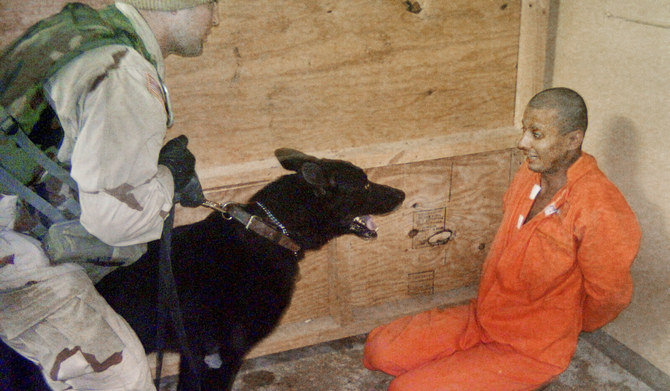
- Raisi said the killings by Israel in Gaza were being committed with the support of the United States and other Western countries
ALEXANDRIA, Virginia: A lawyer for the military contractor being sued by three survivors of the notorious Abu Ghraib prison in Iraq told jurors Monday that the plaintiffs are suing the wrong people.
“If you believe they were abused ... tell them to make their claim against the US government,” said John O’Connor, defense attorney for Reston, Virginia-based military contractor CACI, during closing arguments at the civil trial in federal court. “Why didn’t they sue the people who actively abused them?”
The lawsuit brought by the three former Abu Ghraib detainees marks the first time a US jury has weighed claims of abuse at the prison, which was the site of a worldwide scandal 20 years ago when photos became public showing US soldiers smiling as they inflicted abusive and humiliating treatment on detainees in the months after the US invasion and occupation of Iraq.
The suit alleges that civilian interrogators supplied by CACI to Abu Ghraib contributed to the torture the plaintiffs by conspiring with military police to “soften up” detainees for interrogations.
CACI, in its closing arguments, relied in part on a legal theory known as the “borrowed servant doctrine,” which states an employer can’t be liable for its employees’ conduct if another entity is controlling and directing those employees’ work.
In this case, CACI says the Army was directing and controlling its employees in their work as interrogators.
Lawyers for the plaintiffs disputed that CACI relinquished control of its interrogators to the Army. At trial, they introduced evidence that CACI’s contract with the Army required CACI to supervise its own employees. Jurors also saw a section of the Army Field Manual that pertains to contractors and states that “only contractors may supervise and give direction to their employees.
Muhammad Faridi, one of the plaintiffs’ lawyers, told jurors that the case is simpler than CACI’s lawyers are trying to make it.
He said that if CACI interrogators conspired with military police to inflict abuse on detainees to soften them up for interrogations, then the jury can find CACI liable even if CACI interrogators never themselves inflicted abuse on any of the three plaintiffs.
All three plaintiffs testified to horrible treatment including beatings, sexual assaults, being threatened with dogs and forced to wear women’s underwear, but said the abuse was either inflicted by soldiers, or by civilians who couldn’t be identified as CACI workers. In some cases, the detainees said they couldn’t see who was abusing them because they had bags over their heads.
As evidence of CACI’s complicity, jurors heard testimony from two retired generals who investigated the Abu Ghraib scandal in 2004; both concluded that CACI interrogators engaged in misconduct.
Faridi told the jury that while many of the soldiers who abused detainees were convicted and sentenced to prison, CACI has not yet been held accountable.
“When our country’s military found out about the abuse, they didn’t cover it up,” Faridi said. “Our country’s military held the military police members who were perpetrating the abuse accountable. CACI escaped liability.”
And Faridi said that even when the Army asked CACI to hold its its interrogators responsible, it still sought to evade responsibility. In May 2004, the Army asked CACI to fire one of its interrogators, Dan Johnson, after one of the Abu Ghraib photos showed Johnson interrogating a detainee who was forced into an awkward crouching position that investigators concluded was an illegal stress position.
CACI contested Johnson’s dismissal, writing that the “photo depicts what appears to be a relatively relaxed scene” and saying that “squatting is common and unremarkable among Iraqis.”
“I’ll leave that to you to consider whether you find that offensive,” Faridi told the jury Monday.
At trial, CACI employees testified they defended Johnson’s work because Army personnel had asked them through back channels to do so. O’Connor said that out of the many hundreds of photos of abuse at Abu Ghraib, the photo of Johnson is the only one depicting a CACI employee, and it shows him questioning not one of the plaintiffs but an Iraqi policeman after someone had smuggled a gun into the prison and shot at military police.
O’Connor also apologized for parts of his case that were “long, annoying and boring” but said he had no choice because the US government claimed that some evidence, including the identities of interrogators, was classified. So jurors, rather than hearing live testimony, were subjected to long audio recordings in which the interrogators’ voices were doctored and their answers were often interrupted by government lawyers who instructed them to not answer the question.
The trial was delayed by more than 15 years of legal wrangling and questions over whether CACI could be sued. Some of the debate focused on the question of immunity — there had long been an assumption that the US government would hold sovereign immunity from a civil suit, and CACI argued that, as a government contractor, it would enjoy derivative immunity.
But US District Judge Leonie Brinkema, in a first-of-its-kind ruling, determined that the US government cannot claim immunity in cases involving fundamental violations of international norms, such as torture allegations. And, as a result, CACI could not claim any kind of derivative immunity, either.
The eight-person jury deliberated about three hours before pausing Monday afternoon without reaching a verdict. Deliberations are set to resume Wednesday.
India’s Modi accused of targeting Muslims in election speech
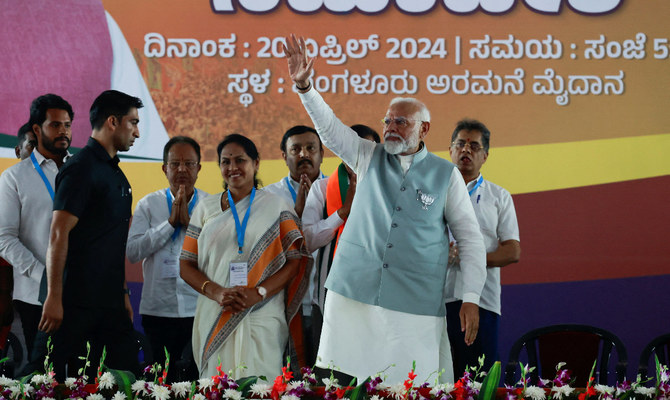
- Modi’s muscular Hindu-first politics is a key part of his electoral appeal and his opponents accuse him of marginalizing India’s 200 million Muslim population
NEW DELHI: India’s main opposition Congress party filed a complaint to the Election Commission Monday accusing Hindu nationalist Prime Minister Narendra Modi of “blatantly targeting” minority Muslims in a campaign speech.
The world’s most populous country is constitutionally secular and its election code bans canvassing based on “communal feelings.”
Modi’s muscular Hindu-first politics is a key part of his electoral appeal and his opponents accuse him of marginalizing India’s 200 million Muslim population.
The prime minister usually steers away from explicit references to religion — the word “Hindu” does not appear in his Bharatiya Janata Party’s (BJP) 76-page election manifesto.
But at a weekend election rally in Rajasthan, Modi claimed a previous Congress government had said that “Muslims have the first right over the nation’s wealth.”
He said if Congress won “it will be distributed among those who have more children. It will be distributed to the infiltrators.”
“Do you think your hard-earned money should be given to infiltrators? Would you accept this?“
Critics said the phrases were references to Muslims.
In its complaint to the Election Commission, the Congress party said the “divisive, objectionable and malicious” comments were targeted at “a particular religious community” and amounted to “blatant and direct violations of electoral laws.”
They were “far worse than any ever made by a sitting Prime Minister in the history of India,” the complaint said.
Congress party spokesperson Abhishek Manu Singhvi told reporters outside the Commission’s office: “We hope concrete action will be taken.”
Modi and the BJP are widely expected to coast to victory in India’s marathon elections, which began last Friday and with the results due on June 4.
Earlier this year, Modi presided over the inauguration of a grand temple to the deity Ram, built on the site of a centuries-old mosque razed by Hindu zealots.
The BJP has frequently invoked the temple on the campaign trail.
BJP spokesperson Gaurav Bhatia told reporters Monday that Modi was calling “a spade a spade” and his remarks resonated with what people thought.
Hamas has ‘moved goal post’ on hostage talks, says State Dept
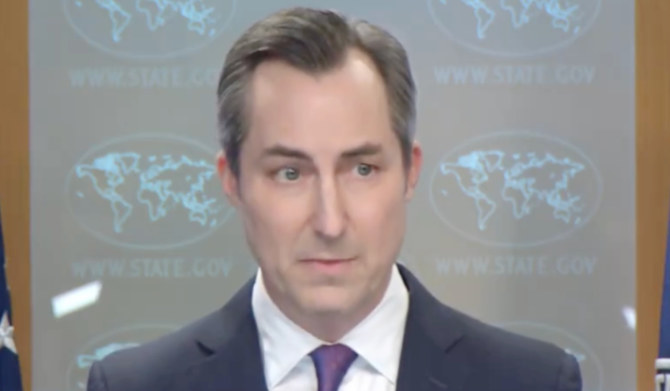
- Miller said the United States had received a report by former French Foreign Minister Catherine Colonna into the UN aid agency for Palestinians, UNRWA, and is reviewing it
- Israel has killed 34,151 Palestinians, mostly women and children, according to the Hamas-run territory’s health ministry
WASHINGTON: Palestinian militant group Hamas has “moved the goal post” and changed its demands in the hostage negotiations with Israel mediated by Egypt and Qatar, State Department spokesperson Matthew Miller said on Monday.
Speaking at a daily press briefing, Miller said the United States would continue to push for an agreement that would see hostages taken on Oct. 7 released and a pause in fighting in Gaza.
Separately, Miller said the United States had received a report by former French Foreign Minister Catherine Colonna into the UN aid agency for Palestinians, UNRWA, and is reviewing it.





